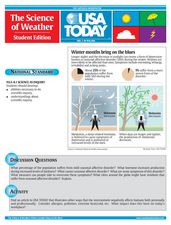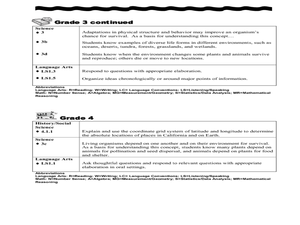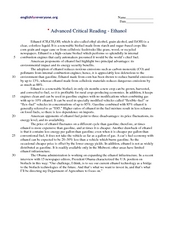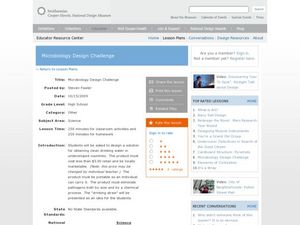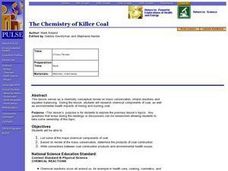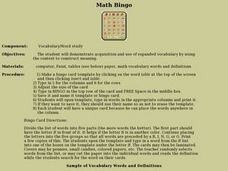Curated OER
Wat-er We Good For?
Fifth graders investigate the use of water as a resource that needs to be conserved. They practice the skill of water conservation by taking a home survey of water usage and modify the use in order to decrease the wasting of water.
Curated OER
Now You Have It, Now You Don't
Students compare shipping peanuts made from corn and made from Styrofoam. In this corn based peanuts lesson plan, students understand why to use eco-friendly materials for packing. Students participate in an experiment to compare the...
Curated OER
The Many Uses of Trees
Young scholars list all the ways humans use trees and tree by products. In this lesson students watch a video, discuss the impact trees have on humans, and research common products made from trees. The young scholars use their findings...
Curated OER
Fieldwork: Horizons Under Ground: Digging Through Wetland Soil
Learners study the different soil types and describe the different soils in various environments. In this soil lesson students walk to a reserve and discuss what they saw.
Curated OER
Watershed Landscape
Students demonstrate how water flows by building a human watershed using themselves. In this ecology lesson, students compare and contrast point-source and non-point source pollution. They write what they have learned from this activity...
Curated OER
The Science of Weather
Middle schoolers read an article. In this seasons lesson, students discuss the seasons and seasonal affective disorder. Middle schoolers find an article that illustrates other ways that the environment negatively effects humans.
Curated OER
Common Agricultural Policy
In this European Union worksheet, students respond to 6 short answer and 8 fill in the blank questions about the Common Agricultural Policy.
Curated OER
Celebrating Earth Day
Students explore environmental safety by planting seeds outside their classroom. In this Earth Day lesson, students identify the different ways to recycle and conserve resources on Earth while facilitating recycling bins around campus....
Curated OER
Breaking News English: New Machine Sucks CO2 from the Air
In this English worksheet, students read "New Machine Sucks CO2 from the Air," and then respond to 1 essay, 47 fill in the blank, 7 short answer, 20 matching, and 8 true or false questions about the selection.
Curated OER
The Quest For Power
High schoolers investigate and apply properties of math. In this algebra and physics lesson, students define important vocabulary words to create a basic understanding of keywords. They perform experiments using concepts of electricity...
Curated OER
The Common Tragedy of Consumerism
Students evaluate the effectiveness of current climate change solutions. In this global warming lesson, students look at the current measures implemented and analyze whether they are beneficial to the environment or not. Advance reading...
Curated OER
Earth Pockets
Students identify the Earth's natural resources. In this Earth science lesson plan, students read the book The Great Kapok Tree and discuss types of natural resources. Students use categories such as wood, paper, and trees and list items...
Curated OER
Advanced Critical Reading: Ethanol
In this advanced critical reading worksheet, students read a passage about ethanol then answer questions. Students make inferences, determine author's purpose and use context clues to find the meaning of unknown words in the passage.
Curated OER
Climate Change Quiz
In these climate change worksheets, students read through the fourteen questions about climate change. Students select the correct answer to complete the quiz.
Curated OER
Food or Fuel?
High schoolers describe the process of transesterification utilizing chemical formulas. They construct and compare models of chemical structure of the substances involved in biodiesel production such as: alcohols, alkenes, alkanes,...
Curated OER
Biodiesel Combustion and Its Influences in NOx Emissions
Tenth graders evaluate the physical mechanisms that cause a change in NOx emissions. In this combustion lesson, 10th graders participate in a research project. Students create a presentation of their findings.
Curated OER
Toward a Sustainable Agriculture
Learners examine how to use ecological analysis to animal production systems. In this sustainable agriculture lesson students examine where the nutrients flow in a system and complete several activities.
Curated OER
Is Climate Change Good for Frogs?
Students fill out a chart on how climate change would affect them and things around them. In this climate change lesson plan, students discuss how global warming affects them and amphibians and then fill out the chart that goes with it.
Curated OER
Microbiology Design Challenge
Students discover dangers to human health by researching what's in our drinking water. In this water purification lesson, students discuss the conditions of water in undeveloped countries and why it is unsafe to drink....
Curated OER
What are Properties of Wood?
Students use hands on scientific observation to determine characteristics of wood. They work directly with the materials and record their observations. Students test if wood absorbs water, if wood floats or sinks, and if all wood...
Curated OER
Reading Comprehension- The Use of Senses in Poetry
For this reading comprehension poetry worksheet, students identify the use of the senses in a poem entitled, "As I Awake." They discuss how the author feels about being alive and if the author believes that one person can change the world.
Curated OER
Oil Market Basics
In this natural resources worksheet, students take a ten question quiz based on their knowledge of the oil market. This a multiple choice quiz.
Curated OER
The Chemistry of Killer Coal
Students research chemical components of coal, as well as environmental health impacts of mining and burning coal. They discuss conservation of mass as it relates to combustion of organic compounds.
Curated OER
Math Bingo!
Learners discover how to change units of measurement by multiplication and division applications. They play math bingo solving multiplication and division problems. Students review their anwers by checking them in class.





